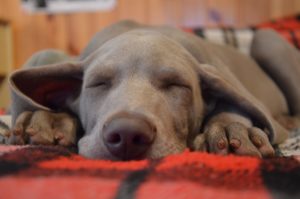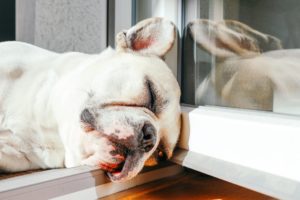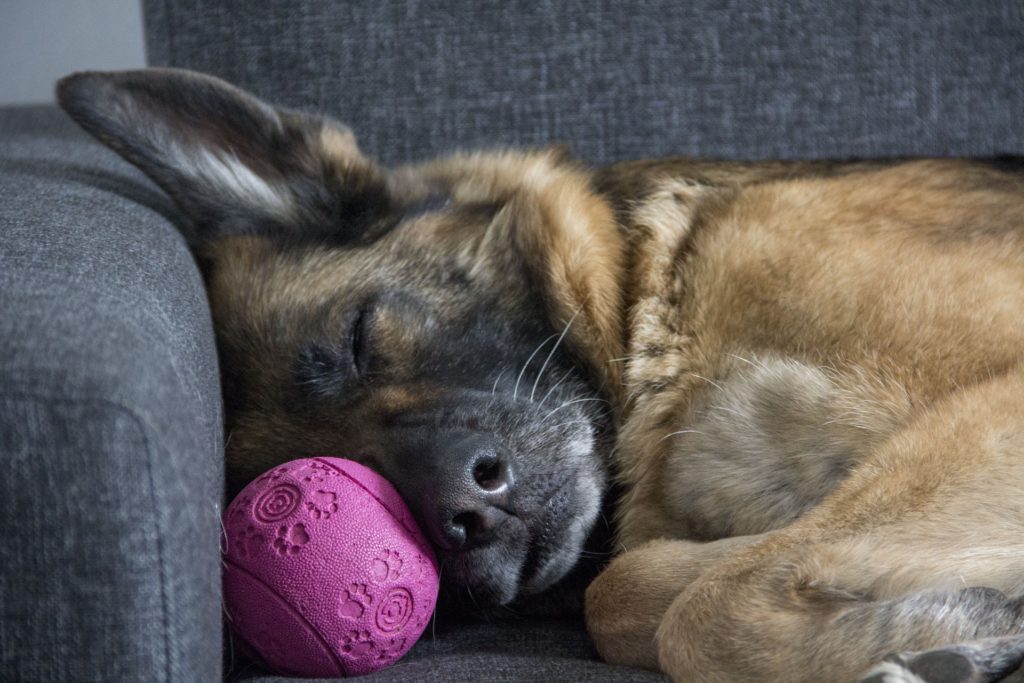Whether gazed upon with concern or envy, canines seem to be asleep for a good portion of the day. Adult humans average approximately 8 hours of sleep a night, so why do dogs seem to require more beauty rest than people do?
Different Breeds, Different Bed Times
Breed determines everything from ideal diet and appetite to obedience tendencies in dogs, so it should come as little surprise that it affects sleep needs as well. For “working breed” dogs such as collies and huskies, their natural energy and enthusiasm translates to more alertness, particularly when they’re young.
These types of dogs are bred for a task, which means they can become easily bored, restless, or even destructive when left without stimulation for too long. Therefore, they need more activity throughout the day in order to be tired out for a good night’s rest. Smaller “lap” dogs that aren’t bred for a specific task are more content with napping the day away and lead a more sedentary lifestyle – their sleep genetics aren’t working against them. Keeping these facts in mind, it’s important to understand that different dogs require different amounts of sleep depending on breed, age, and even preexisting health conditions.
Note: Just as a person’s day goes more smoothly when they are organized, a dog also appreciates the predictability of a routine. For pet parents who would prefer their pooch to rise at the same time they do, make it a habit to catch a morning walk together – he’ll be eager to wake up and get moving when he hears his owner get out of bed.
Older Dogs, Longer Naps
 Humans and dogs have distinct sleep patterns at certain ages – puppies and babies nod off easily, as their growing bodies and high energy levels during the day tire them out. Additionally, seniors of both species no longer have the natural energy they once did, and typically require more and more rest to recuperate from the day’s activities. For dogs approaching the double-digits in age, don’t be surprised if he’s more eager to spend time sleeping than playing or exploring in the afternoons – his “batteries” are likely in need of a recharge.
Humans and dogs have distinct sleep patterns at certain ages – puppies and babies nod off easily, as their growing bodies and high energy levels during the day tire them out. Additionally, seniors of both species no longer have the natural energy they once did, and typically require more and more rest to recuperate from the day’s activities. For dogs approaching the double-digits in age, don’t be surprised if he’s more eager to spend time sleeping than playing or exploring in the afternoons – his “batteries” are likely in need of a recharge.
On a 24-hour cycle, humans spend about one-third of that time resting or sleeping. Dogs, on the other hand, can spend anywhere from 50–75% of it either actively sleeping or laying down resting. Remember: what may seem like a lot of sleep to humans may be quite normal for the family dog.
Is He Sleeping Too Much: Recognizing The Signs
Even bearing in mind that 50–75% sleep statistic, dogs can sleep too much if they have some health or mental problems. Extra sleep becomes problematic if it happens suddenly and without a clear reason. If a dog is suddenly sleepy and sluggish when he was energetic the week before, it’s time to give the vet a call. He may have canine influenza, or breathing issues, and is trying to conserve his energy – a veterinarian can listen to his lungs or take X-rays as needed. In some cases, a change in diet may also help to perk up a pooch if he is experiencing canine lethargy.
For dogs that have recently undergone a major change (such as a move or the loss of another household pet), this may also affect his sleeping habits. Dogs can become depressed or listless just as their human counterparts do, and look to sleep as a sort of “default setting” when the stress becomes too much. For households facing any kind of major changes, be sure to take some extra time to soothe and reassure the family pup that everything is okay. A soft, new bed, some cuddles and perhaps a chew toy or two can go a long way towards lifting his spirits.
He May Not Be Getting Quality Sleep
 Dogs will curl up just about anywhere for a nap, but that doesn’t mean all napping spots are created equal. When humans are too hot or cold, they have the ability to adjust the temperature in their homes or put on/remove an extra layer of clothing. If one’s bed is uncomfortable, purchasing a mattress topper or a new bed usually solves the problem. However, dogs don’t have those same luxuries, which may be the reason they’re not sleeping soundly. Minimize a dog’s sleep disruptions by keeping his sleeping area dark, temperate, and quiet, and buying a supportive dog bed to cushion his joints at night; proper bedding is especially essential for senior dogs and aging canines with joint or skeletal problems (such as canine hip dysplasia) and canine arthritis. If a dog appears irritable or sluggish in the morning, every morning, it’s a tell-tale sign his sleeping arrangements are due for a reassessment.
Dogs will curl up just about anywhere for a nap, but that doesn’t mean all napping spots are created equal. When humans are too hot or cold, they have the ability to adjust the temperature in their homes or put on/remove an extra layer of clothing. If one’s bed is uncomfortable, purchasing a mattress topper or a new bed usually solves the problem. However, dogs don’t have those same luxuries, which may be the reason they’re not sleeping soundly. Minimize a dog’s sleep disruptions by keeping his sleeping area dark, temperate, and quiet, and buying a supportive dog bed to cushion his joints at night; proper bedding is especially essential for senior dogs and aging canines with joint or skeletal problems (such as canine hip dysplasia) and canine arthritis. If a dog appears irritable or sluggish in the morning, every morning, it’s a tell-tale sign his sleeping arrangements are due for a reassessment.
Dogs are runners, hunters, diggers, pullers, and protectors – and all that translates to a lot of hard work. As pet parents, it’s important to provide canine companions with the necessary shut-eye. Unless his sleep patterns change suddenly and drastically in either direction, chances are there’s nothing wrong and he’s just enjoying a few more dreams about chasing squirrels. Invest in a routine, a quiet, temperate sleeping area, and a good-quality dog bed to ensure his happiness and well-being for years to come.
Sources Cited:
Clark, Heidi. “Why Do Dogs Sleep So Much?” American Kennel Club (AKC.org), August 23, 2016, https://www.akc.org/expert-advice/health/why-do-dogs-sleep-so-much/. Accessed April 18, 2019.
Elliot, Pippa. “The Adorable Truth behind Why Dogs Sleep all Day.” Petcube.com, September 18, 2018, https://petcube.com/blog/why-dogs-sleep-all-day/. Accessed April 18, 2019.
Anastasio, Alexandra. “Recognizing Behavioral Changes in Senior Dogs.” American Kennel Club (AKC.org), June 12, 2017, https://www.akc.org/expert-advice/health/recognizing-behavioral-changes-in-senior-dogs/. Accessed April 18, 2019.




